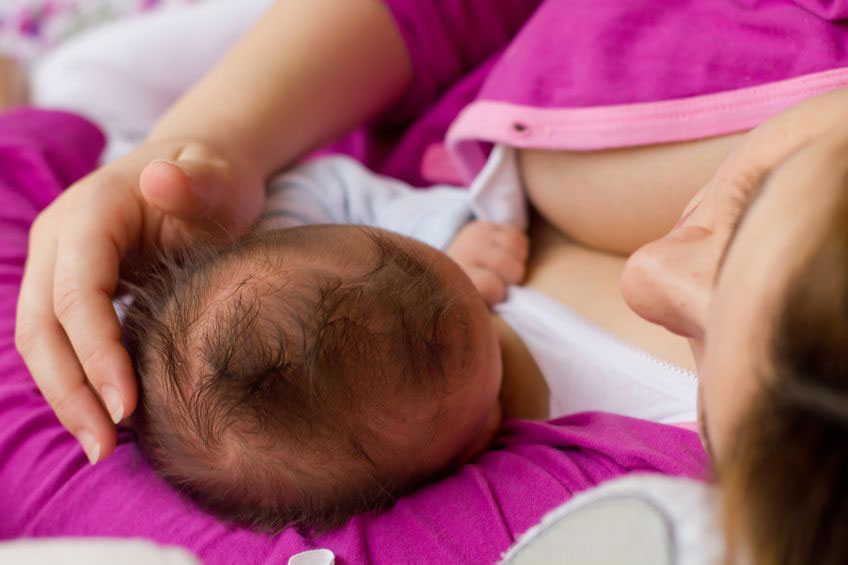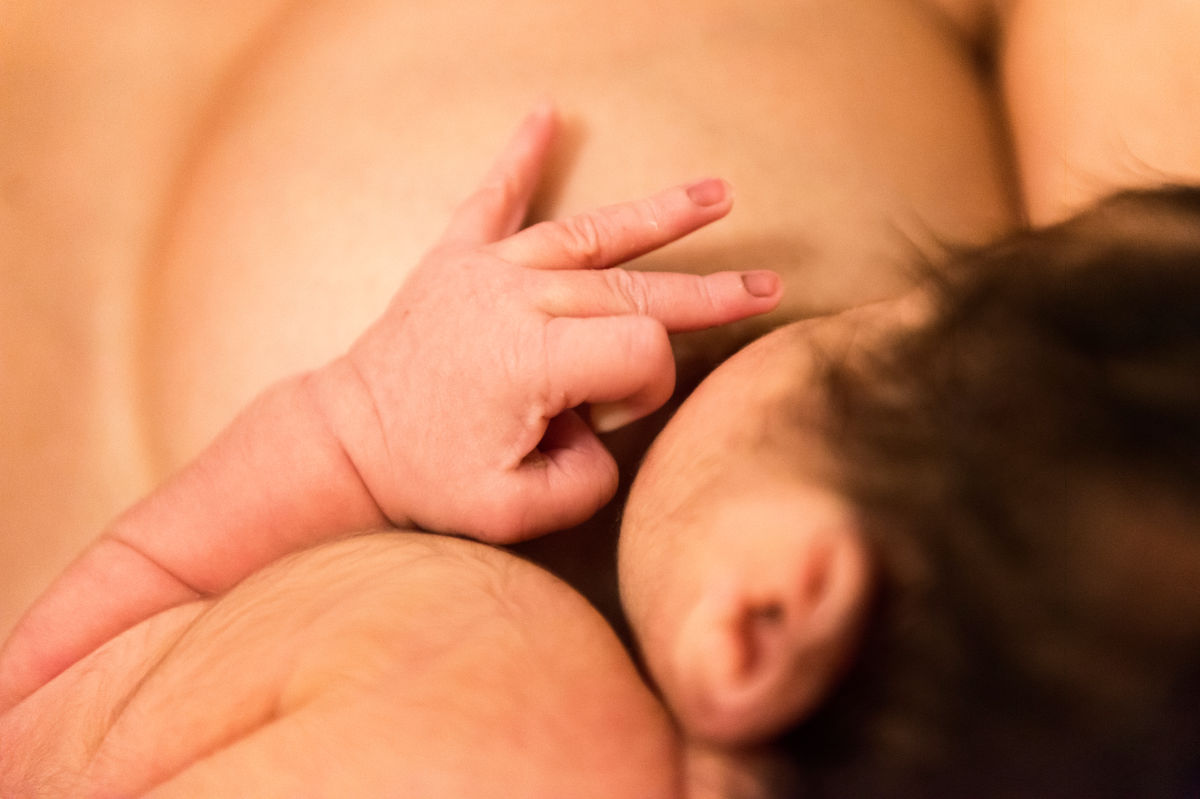Postnatal depression (PND) or postpartum depression (PPD) are the names given to depression—feelings of sadness and low mood—that can sometimes follow childbirth. Depressed mothers are more likely to stop breastfeeding earlier leading to negative health effects for both mother and baby.1 It is important that depression be diagnosed and treated quickly as symptoms can have a major impact on a mother’s well being, her baby and her family. This article looks at the symptoms and causes of depression and treatments compatible with breastfeeding.
What are the symptoms of postnatal depression?
Symptoms might include:
- Difficulty sleeping (unrelated to baby waking for feeds)
- Unable to enjoy the baby or anything else
- Feeling very tired, overwhelmed, unable to cope, unmotivated
- Difficulty remembering things and making decisions
- Feeling sad, hopeless, negative or irritable
- Excess anxiety, panic attacks, crying
- Loss of appetite (or comfort eating)
- Thoughts about self-harm
For more information including how to spot the signs of depression in yourself or loved ones, and other related conditions, see Symptoms Postnatal Depression (NHS, 2022).
What are baby blues?
Feeling tearful a few days after birth is often called the baby blues and seems to be associated with the sudden change in hormones after birth. A few days of rest and support are usually all that are needed and it usually passes in a few days. This is quite different to postnatal depression which continues for weeks or months.
What causes depression?
Postnatal depression has many risk factors that will vary between individuals. Stress, pain, lack of sleep, diet, pre-existing depression, birth trauma and lack of support are all important risk factors. Although depression is often linked to hormonal changes after birth there is not yet much scientific support for this theory.2
Causes include:
#1 Stress and inflammation
Physical and mental stress including pain (see #2) and sleep disturbance are particular risk factors for women who have just given birth. They are risk factors because:
- Physical and mental stress can trigger an inflammatory response from the immune system and this is a key factor in depression.3
- High levels of cytokines (specific cells) produced by the stressed immune system promote inflammation which can cause depression and disrupt the levels of cortisol and serotonin in the body (substances that help the body regulate stress, mood, appetite and sleep).
Lowering a mother’s stress and reducing inflammation may prevent or reduce depression.
#2 Pain
New mothers are at particular risk of experiencing pain because:
- Childbirth can be painful and pain can increase stress and inflammation and disturb a mother’s sleep.
- Breastfeeding problems such as severe nipple pain, or not being able to breastfeed as long as a mother wanted to can also increase the risk of depression and must be looked at promptly. Pamela Douglas explains:
Nipple pain is a distressing sensory and emotional experience which interferes with maternal mood, activity, and sleep, whether or not there is visible damage. Not surprisingly, it also predisposes to postnatal depression.
For help with pain related to breastfeeding contact an International Board Certified Lactation Consultant and see Why Does Breastfeeding Hurt?

#3 Lack of sleep
- Getting enough sleep is very important for mental health. Disturbed sleep and being extremely tired are risk factors for depression.
- Lack of sleep also has an effect on the immune system and the levels of inflammation in the body which negatively affects the ability to sleep in a self perpetuating cycle.
- Being tired can be a symptom of depression as well as a risk factor for it, sleep and depression are intricately connected.
Breastfeeding and sleep
Breastfed babies usually need to feed often during the night and it is a common assumption that breastfeeding mothers must get less sleep than formula-feeding mothers. However research has shown that breastfeeding mothers get more sleep. Lack of sleep due to breastfeeding is not therefore thought to be a risk factor for depression.4
Getting enough sleep
For more ideas about getting enough sleep with your breastfed baby and coping with depression see Sweet Sleep: Nighttime and Naptime Strategies for the Breastfeeding Family, LLLI, 2014 especially Chapter 10 Your Own Sleep Needs. There is a book review here.
Research shows that breastfeeding mothers get more sleep than formula feeding mothers.
#4 Traumatic birth
A traumatic birth is a highly stressful event and therefore a risk factor for depression. A woman may feel out of control, anxious, unsupported, overwhelmed, disrespected, violated or in severe pain following a very difficult birthing experience.
- Traumatic birth can be associated with depression or post traumatic stress disorder (PTSD) particularly if the mother is already prone to depression. Counselling for a traumatic birth can be very helpful
- Traumatic births can make breastfeeding more difficult and can cause a delay to the milk coming in due to high levels of stress hormone (cortisol) (Kendall-Tackett, 2017).
- Difficulty breastfeeding could add to the feelings of stress and trauma however breastfeeding can also be very healing when it runs smoothly.
#5 Diet
Low levels of essential fatty acids (EFAs) in the diet, especially two known as EPA (eicosapentaenoic acid) and DHA (docosahexaenoic acid), may increase the risk of depression in mothers. These long-chain omega-3 fatty acids (omega-3s) are found in fish and fish-oil products. There is more information in the article below by Kathleen Kendall-Tackett and see Best Breastfeeding Diet and Foods to Avoid.
Underweight, overweight
Being both underweight or overweight could also be risk factors for depression.56
#6 Thyroid, iron, and blood sugar levels
In Mother Food, the author discusses four other common health issues that may contribute to post natal depression; anaemia (low iron), low levels of potassium, low blood sugar and low thyroid function (hypothyroidism), explaining that each of these can lead to exhaustion, irritability, and depression.
#7 Lack of support
Lack of help and support for the new mother is another risk factor for depression along with stressful life events, the mother’s age (e.g. very young or older mothers), low income and cultural support.
#8 Other factors
Other factors that might affect a mother’s risk of depression and are mentioned in 7 include:
- Personality traits, psychiatric history
- Prior trauma or abuse
- Physical inactivity
- Smoking
- Allergic disorders
- Vitamin D deficiency
- Vaccinations and changes to our gut microbiome might also increase the risk of inflammatory diseases (Kendall-Tackett, 2017).
- Baby’s personality or health—a very demanding or poorly baby can be a challenge to a mother’s mental wellbeing.

Postnatal depression and breastfeeding
Breastfeeding problems increase the risk of having depression, and depression increases the risk of a mother stopping breastfeeding early.8. A 2016 study with mice suggests depression may have a negative effect on milk supply.9 Depressed mothers may not be as responsive to their babies’ cues and may interact less or more negatively with them10 so it is important for both mother and child that depression is taken seriously and treated promptly. In contrast, although breastfeeding mothers can still become depressed, successful breastfeeding can reduce stress, protect maternal health and be protective of the baby:
Breastfeeding can reduce stress
Breastfeeding is thought to be protective against depression because it can reduce stress and promote nurturing behaviours.1112 The breastfeeding hormones oxytocin and prolactin have antidepressant effects and can reduce anxiety.13
Breastfeeding can protect maternal mental health
Breastfeeding can help protect maternal mental health.1415 Borra et al looked at how breastfeeding influenced the risk of PND. They found that for mothers who weren’t already depressed during pregnancy, a higher risk of postnatal depression was found in mothers who wanted to breastfeed but hadn’t gone on to breastfeed. Also there was a lower risk of PND for those who wanted to breastfeed and succeeded to meet their goals.16 Another study found that breastfeeding reduced the risk of PND for subsequent children, but not for the first born child (Mezzacappa and Endicott, 2007).
Breastfeeding protects the baby
Breastfeeding can help to protect babies from any potentially harmful effects of their mother’s depression through more frequent positive interactions (a baby has to frequently be held close to breastfeed) and resulting healthier brain activity. 17 Skin-to-skin contact is an important part of this (see next section).

Treatments for depression
Talk to your GP if you think you might have postnatal depression and they will help you find the right support. Treatment ideas include measures such as skin-to-skin contact between mother and baby, changes to diet, exercise, light therapy, counselling, herbs and medication.
Skin-to-skin contact
Skin-to-skin contact between mother and baby may help to reduce the risk of moderate-to-severe postnatal depression and help protect a baby from the effects of maternal depression.1819 For more information on how skin-to-skin contact can help mother and baby see Why Skin-to-Skin?

Diet
Omega-3 fatty acids
Omega-3 fatty acids have anti inflammatory properties and are found in some plants and fatty fish. In contrast omega-6 fatty acids found in vegetable oils are pro inflammatory in excess. Many diets today contain such a high ratio of omega-6 to omega-3 that it can have a negative impact on our health. Omega-3 fatty acids are said to have a role in not only preventing depression but treating it too:
The long-chain Omega-3 fatty acids, EPA and DHA, have been used successfully to both prevent and treat depression. Both of these are found in fatty fish. EPA is the Omega-3 that actually treats depression because it specifically addresses the physiologic consequences of depression and lowers the stress response. It has been used by itself or has been combined with medications. When it is used with medications, it makes medications work more effectively.
Other supplements
Other nutrients may have a role to play in helping depression.
- Vitamin D deficiency increases inflammation and has been linked to inflammatory diseases such as rheumatoid arthritis, diabetes and depression20.
- S-Adenosyl methionine (SAMe) is a substance that occurs naturally in the body and is involved in regulating serotonin, melatonin, dopamine and adrenaline.
Vitamin D, folate and S-Adenosyl methionine (SAMe) are considered in this discussion of research Vitamin D, Fish Oil and Folates May Enhance Antidepressants [no date, accessed 3rd April 2025].
Regular exercise
Exercise can work as an antidepressant because it lowers inflammation and can be used on its own or combined with other treatments. Kathleen Kendall Tackett says:
Exercise can treat even major depression. Yes, you can exercise instead of taking antidepressants. Traditionally, exercise has been recommended for people with mild-to-moderate depression. But clinical trials that compared exercise to antidepressants found that exercise was as effective in treating major depression as medications. Exercise can also be safely combined with other modalities.
Bright light therapy
Bright light therapy has been used as a treatment for seasonal affective disorder (SAD) for many years but may have a role for non seasonal depression, PND and some eating and sleep disorders. For more information see Non-Drug Treatments for Depression in Pregnant and Breastfeeding Women (by Kathleen Kendall-Tackett).
Counselling
Interpersonal psychotherapy and cognitive behavioural therapy are types of counselling that can help mothers with postnatal depression and co-occurring conditions e.g. anxiety, obsessive compulsive disorder, and chronic pain.
St John’s wort
St John’s wort is a widely used herbal antidepressant compatible with breastfeeding 21. Always discuss taking herbal medications with your doctor. St John’s wort should not be taken in conjunction with prescription antidepressants and can react with several medications.
Prescription antidepressants
For some mothers prescription antidepressants will be the best choice of treatment. There are several antidepressants that can be used when breastfeeding. As with any drug, there may be a risk of side effects when using antidepressants, but the risk of not treating the depression may be higher still. All the risks and benefits must be carefully weighed up for each mother and baby.
Which antidepressants can I take?
Antidepressants and Breastfeeding (2022) is a drugs fact sheet by The Breastfeeding Network in UK which describes the compatibility of many antidepressants with breastfeeding, the drug levels in breast milk, and the potential side effects for mother or baby.
In her article below Kathleen Kendall-Tackett states that paroxetine, sertraline and nortriptyline are unlikely to lead to detectable or elevated plasma drug levels in a breastfeeding infant.
breastfeeding infants’ exposure to paroxetine, sertraline and nortriptyline are unlikely to have detectable or elevated plasma drug levels. In contrast, infants exposed to fluoxetine had higher medication levels, especially if they had also been exposed prenatally. Citalopram may lead to elevated levels in some infants, but more data are needed. Although these appear safe for the majority of babies, some adverse effects have been identified through case studies. Therefore, breastfeeding mothers should be advised to watch for any possible signs of adverse reactions including irritability, poor feeding, or uneasy sleep. Premature babies or other with impaired metabolite efficiency should especially be monitored for adverse effects.
There are several resources online that discuss drug compatibility with breastfeeding. See Medications and Breastfeeding for links and further information.
Summary
A number of risk factors can be associated with postnatal depression such as stress and inflammation, pain, diet, and lack of sleep. Breastfeeding is not a risk factor when feeding is going well as it can reduce stress, nurture more contact between mother and baby and breastfeeding mothers get more sleep than formula feeding mothers. Breastfeeding problems should be addressed quickly however as pain and difficulty can add to feelings of depression. Depression is a major risk factor for stopping breastfeeding. There are several treatments for depression that are compatible with breastfeeding including prescription antidepressants.